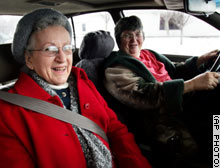|
|
Elderly on the Go, But Not Behind Wheel
The Associated Press
January
17, 2006

AP
Margaret Emmons had not driven in more than 20 years. So when her husband died last fall, she had no use for their 1997 Ford Taurus.
Rather than sell it or give it away, she decided to trade it for rides through the Independent Transportation Network. Now, all she has to do is call for someone to come and give her a lift, perhaps even in her old car.
"It's what saves me," Emmons, who is 80, said after returning from the grocery store on a snowy day. "I'd be sunk without it."
Launched a decade ago, the Portland, Maine, area's Independent
Transportation Network provided 15,200 rides to senior citizens last year with no taxpayer money for operations.
The concept of trading in cars for rides is aimed, in part, at getting elderly motorists off the road when they can no longer drive safely. The program was the brainchild of a mother whose son was run over by an elderly man.
The Portland idea is catching on. This year, pilot programs are being launched in Santa Monica, California; Orlando, Florida; Charleston, South Carolina and the Trenton, New Jersey, area. Sen. Susan Collins, R-Maine, plans to propose a five-year, $25 million federal grant program to take the idea nationwide.
Katherine Freund came up with the concept after she watched in disbelief as a motorist ran over her 3-year-old son, Ryan, as he played in front of their house in 1988. The Buick never stopped, and the 84-year-old driver later told investigators that he thought he had run over a dog.
The accident left her toddler in a coma. Ryan eventually recovered, and Freund went on to study the issue of senior drivers while in graduate school.
"What was a personal experience for me was a much larger social problem," she said. "I thought, `This thing has to be fixable.' This isn't a disease for which there's no cure. We know what the solution is: We need transportation for the elderly."
By the time she left the University of Southern Maine with a degree in public policy, she had refined her idea. The former real estate agent knew that senior citizens' cars often get little use. Using the model of a reverse mortgage, a home equity loan that enables people to tap into the value of their homes, Freund applied the formula to cars.
Elderly people trade in their cars and the value is booked into an account from which they can draw to receive rides. Family members and friends also can add to the account by donating cars or cash, or their time as volunteers.
Taxpayers win because the program operates with volunteers and donations. Senior citizens win because they get to ride in a regular car, not a taxi or a bus. And the car comes when they want it. No waiting at cold, icy bus stops.
Communities that help to recruit volunteers are given credits for rides for their elderly people. Doctors, supermarkets and other businesses frequented by senior citizens get into the act by providing small donations for each ride.
An annual campaign helps to meet the $250,000 budget, most of which goes to an executive director, outreach coordinator, two dispatchers and six part-time drivers. There are many more volunteer drivers.
Emmons is one of 1,000 members of the transportation network in Greater Portland. The four pilot communities will begin offering rides this spring and summer.
The need for transportation for people like Emmons is great. The 65-plus population accounts for more accidents per miles driven than any group other than teenagers, according to the Insurance Institute for Highway Safety. And their numbers will swell as the nation's 78 million baby boomers reach their golden years.
Emmons and her husband used the network occasionally when he was too ill to drive. After he died, the network hauled away the couple's car on a flatbed truck. Emmons received about $2,000, the car's wholesale value, which went into her account.
Her Taurus was nicer than most donated cars, so it will join the small fleet of the network's vehicles. The network sells donated vehicles it doesn't need.
Emmons uses the network to go to the doctor's office or to buy groceries. On average, $7 to $8 is deducted from a user's account for each ride. She receives discounts for scheduling her rides in advance and for sharing a ride.
She likes being in control and not having to rely on charity from family or friends.
"The last thing I'm going to do is go begging rides from people," she said.
|
|



